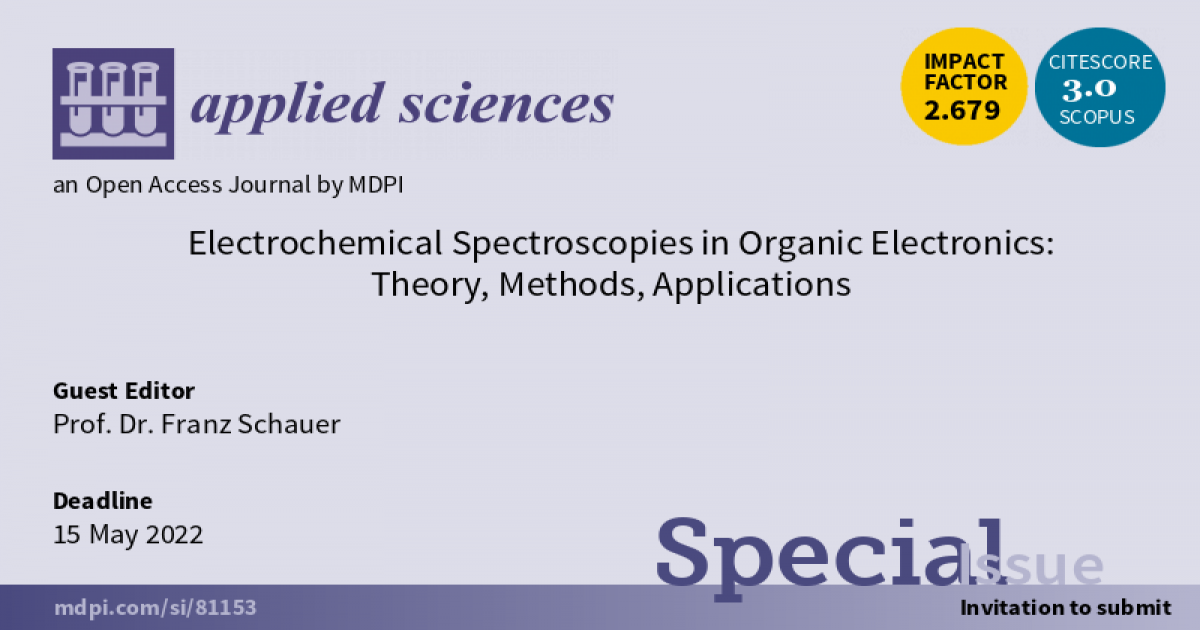Electrochemical Spectroscopies in Organic Electronics: Theory, Methods, Applications
A special issue of Applied Sciences (ISSN 2076-3417). This special issue belongs to the section "Electrical, Electronics and Communications Engineering".
Deadline for manuscript submissions: closed (15 May 2022) | Viewed by 625

Special Issue Editor
Interests: spectroscopy of the electron structure of disordered inorganic semiconductors by spacecharge spectroscopies; presently disordered organic semiconductors by electrochemical methods
Special Issue Information
Dear Colleagues,
Organic electronics applications are envisioned to address a broad market, which includes flexible displays, electronic papers, sensors, disposable and wearable electronics, and medical and biophysical applications, leading to a tremendous amount of interest from both academia and industry in the study of devices. These fields of science and technology constitute interdisciplinary fields that cover physics, chemistry, biology, and materials science, using new synthesized organic materials – organic semiconductors. On the other hand, we face the situation when the available organic electronics applications lack sometimes the theoretical background. The cause may be the complicated properties of disordered, weakly bonded molecular materials with properties different from their inorganic counterparts. One of the basic information-rich resources is the electronic structure of organic semiconductors, with both native and defect states, as well as excited states elucidated by the methods, hardly possible to be transferred from the branch of inorganic semiconductors, enabling the introduction of principles of gap engineering [2] to the branch of organic electronics [3].
The electrochemical spectroscopic methods fill with the advantage of this gap for studies of morphological, transport, and recombination properties of organic semiconductors and biophysical materials as will be shown in the prepared and compiled Special Issue “Electrochemical Spectroscopies in Organic Electronics” on the topic.
[1] F. Schauer: Space-charge-limited currents for organic solar cells optimization Sol. Energy Mater. Sol. Cells 87, 235 (2005), [2] F. Schauer: Electronic structure spectroscopy of organic semiconductors by Energy Resolved - Electrochemical Impedance Spectroscopy (ER-EIS), J. Appl. Phys. 2020, 128, 150902, [3] Baessler, Heinz; Kroh, Daniel; Schauer, Franz; Nádaždy, Vojtěch, and Anna Köhler: Mapping the Density of States Distribution of Organic Semiconductors by Employing Energy Resolved-Electrochemical Impedance Spectroscopy, Adv. Funct. Mater. 2021, 31, 2007738
We invite you cordially to participate as co-authors and help to disseminate the utmost prospective field of Molecular Electronics. Short abstracts with your contributions will be appreciated.
Yours,Prof. Dr. Franz Schauer
Guest Editor
Manuscript Submission Information
Manuscripts should be submitted online at www.mdpi.com by registering and logging in to this website. Once you are registered, click here to go to the submission form. Manuscripts can be submitted until the deadline. All submissions that pass pre-check are peer-reviewed. Accepted papers will be published continuously in the journal (as soon as accepted) and will be listed together on the special issue website. Research articles, review articles as well as short communications are invited. For planned papers, a title and short abstract (about 250 words) can be sent to the Editorial Office for assessment.
Submitted manuscripts should not have been published previously, nor be under consideration for publication elsewhere (except conference proceedings papers). All manuscripts are thoroughly refereed through a single-blind peer-review process. A guide for authors and other relevant information for submission of manuscripts is available on the Instructions for Authors page. Applied Sciences is an international peer-reviewed open access semimonthly journal published by MDPI.
Please visit the Instructions for Authors page before submitting a manuscript. The Article Processing Charge (APC) for publication in this open access journal is 2400 CHF (Swiss Francs). Submitted papers should be well formatted and use good English. Authors may use MDPI's English editing service prior to publication or during author revisions.
Keywords
- Organic semiconductors;
- Electronic structure;
- Charge sarriers, Generation, Transport and Recombination;
- Electron-transfer and Redox reactions;
- Excited state;
- Gap engineering, Device modelling and Orgainc electronics devices.
Benefits of Publishing in a Special Issue
- Ease of navigation: Grouping papers by topic helps scholars navigate broad scope journals more efficiently.
- Greater discoverability: Special Issues support the reach and impact of scientific research. Articles in Special Issues are more discoverable and cited more frequently.
- Expansion of research network: Special Issues facilitate connections among authors, fostering scientific collaborations.
- External promotion: Articles in Special Issues are often promoted through the journal's social media, increasing their visibility.
- Reprint: MDPI Books provides the opportunity to republish successful Special Issues in book format, both online and in print.
Further information on MDPI's Special Issue policies can be found here.





